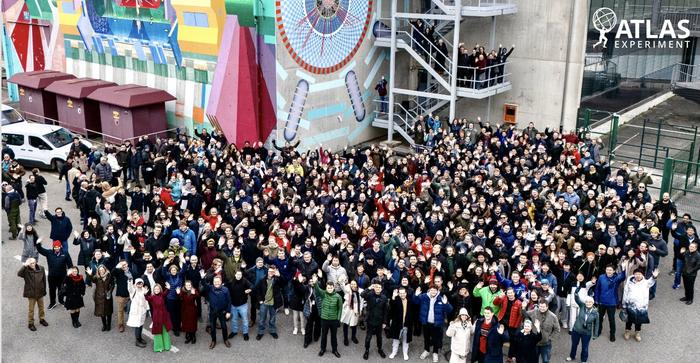The world of fundamental physics has been profoundly enriched by recent achievements arising from the ATLAS Collaboration at CERN’s Large Hadron Collider (LHC). On April 5, 2025, this collaborative effort was acknowledged with the prestigious Breakthrough Prize in Fundamental Physics, a significant honor not only for the collaboration but also for the global community engaged in unraveling the mysteries of the universe. Among those celebrated are scientists from the Johannes Gutenberg University Mainz (JGU), who have contributed significantly to the ATLAS project.
The ATLAS detector stands out as one of the most intricate and massive scientific instruments ever built, measuring over 40 meters in length and approximately 25 meters in height. Its primary goal is to probe the fundamental components of matter and the fundamental forces shaping the cosmos. This sophisticated apparatus employs state-of-the-art technology to track particles emerging from high-energy collisions, resulting in groundbreaking discoveries such as the Higgs boson, which has fundamentally altered our understanding of particle mass and the universe itself.
The Breakthrough Prize specifically commends the remarkable contributions made by the ATLAS Collaboration to the field of particle physics. This recognition underscores the collaboration’s advanced techniques in detailing the properties of the Higgs boson, investigating rare particle interactions, and exploring the delicate balance between matter and antimatter—a fundamental aspect of our understanding of the universe. The profound implications of these studies contribute significantly to the ongoing quest for knowledge in the realm of theoretical physics.
Stephane Willocq, ATLAS Spokesperson, expressed that this award reflects the hard work and creativity of thousands of collaborators who strive daily to push the boundaries of scientific inquiry. The acclaim awarded to the ATLAS team is not just a recognition of individual efforts but a celebration of the collective achievement of thousands who have dedicated their careers to exploring the depths of fundamental physics.
Fabiola Gianotti, Director-General of CERN, conveyed her pride in the accomplishments of the LHC collaborations. She emphasized that the honor symbolizes the extraordinary commitment, expertise, and determination demonstrated by researchers worldwide. This collaborative spirit embodies the essence of scientific discovery, elevating humanity’s understanding of the physical laws governing our universe.
The Mainz group, one of the largest university contributors to the ATLAS Collaboration, has been instrumental in the ongoing success of the project. Researchers from JGU have been deeply involved in various aspects of the ATLAS endeavor, including the construction, upgrade, and operation of critical systems. Their significant contributions encompass the design and construction of advanced high-speed electronics for the detector’s trigger system, which plays a vital role in efficiently capturing collision events.
During the second operational phase of the LHC, spanning from 2015 to 2018, the Mainz team spearheaded numerous impactful studies. They engaged in detailed measurements assessing the interaction strength between the Higgs boson and other fundamental particles, leading to groundbreaking conclusions about particle mass generation. The Mainz group’s leadership in these investigations underscores their crucial role in propelling forward the understanding of particle physics and the universe’s fundamental workings.
Volker Büscher, a professor at JGU and a former spokesperson for ATLAS Germany, articulated the excitement within the Mainz group regarding the wealth of scientific results obtained through the ATLAS detector. He shared a forward-looking perspective, expressing anticipation for future investigations that will delve deeper into the fundamental elements of the universe as further data and advancements in detector technology become available.
The successes achieved during Run 2 have showcased the ingenuity inherent within the ATLAS Collaboration. Beyond simply collecting data with unparalleled precision, the team has consistently pursued a deeper understanding of the results generated, demonstrating a relentless drive to decode the complexities of the universe and the behaviors of fundamental particles.
While the accolade from the Breakthrough Prize is a moment of celebration for the ATLAS Collaboration, the focus remains steadfastly on future endeavors. Currently, the third operational phase of the LHC is in progress, alongside rapid preparations for the High-Luminosity LHC upgrade. This ambitious project will significantly enhance the collider’s collision rates and data collection capabilities, paving the way for more exciting discoveries in the coming years.
The Mainz ATLAS team, composed of over 50 passionate physicists and engineers, is heavily involved in optimizing the experiment for the coming chapter of discovery. They lead the development of cutting-edge trigger electronics and contribute to constructing a new high-granularity timing detector for the High-Luminosity LHC. This future upgrade will provide unprecedented collision rates when operational in 2030, unlocking new opportunities for scientific breakthroughs.
As these advancements unfold, it becomes increasingly clear that the ATLAS detector will play a crucial role in harnessing the data produced by high-energy collisions to further push the frontiers of knowledge in particle physics. Willocq concluded by emphasizing the goal of preparing future ATLAS detectors to efficiently analyze the expansive data that will emerge from ongoing and upcoming experiments, reiterating the unwavering commitment of the collaboration to unravel the fundamental building blocks of our universe.
Through concerted efforts and collaborative ingenuity, the ATLAS Collaboration continues to lead the charge in the exploration of fundamental physics, driving the quest for knowledge forward in extraordinary ways.
Subject of Research: Investigation of Fundamental Physics through the ATLAS Experiment at CERN
Article Title: ATLAS Collaboration Honored with 2025 Breakthrough Prize in Fundamental Physics
News Publication Date: April 5, 2025
Web References: CERN News, Breakthrough Prize
References: ATLAS Collaboration Publications, CERN Annual Reports
Image Credits: M. Struik/CERN
Keywords
Particle physics, ATLAS Collaboration, Higgs boson, CERN, breakthrough prize, fundamental forces, universe, scientific discovery, high-luminosity LHC.




